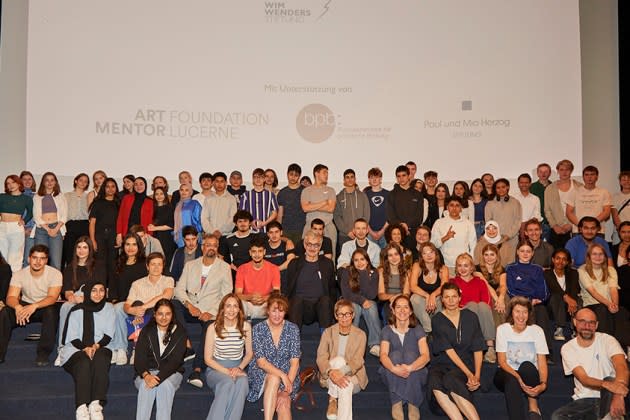Wim Wenders Foundation Broken Down by Wenders Himself: ‘I Had to Take the Idea of Profit Out of the Producer-Audience Relationship’
- Oops!Something went wrong.Please try again later.

Opening the 11th edition of the International Classic Film Market which runs alongside the Lumière Film Festival in Lyon, the floor was given to Hella Wenders and Claire Brunel, the managing directors of the Foundation set up by Wim Wenders, the recipient of this year’s lifetime achievement Lumière Award.
Thanks to public and private funding, the non-profit foundation was able to buy back the rights to the German filmmaker’s entire body of work in 2012, which includes 52 films both long and short, with a very clear objective: To preserve, maintain and disseminate Wenders’ works, and make it permanently accessible to the public worldwide.
More from Variety
In a conversation earlier this year with Gianluca Farinelli, who heads the Bologna Film Archives and its film restoration lab, a world leader in film preservation, Wenders explained it simply.
“Movies are only living because there’s an audience that sees them. […] If anyone wants to make a profit from a film, he steals it from the people. The movies need to be preserved to continue having a life. So, I had to take the idea of profit out of the relationship between producer or rights holder/owner and the audience – the foundation model allowed us to do that.”
He added: “My films are grown up and don’t need me anymore. They need the Foundation and the Foundation needs them. The Foundation doesn’t make profits from them, it is there to serve them. And the movies are there to serve their purpose, which is to serve you [the public].”
As part of its responsibility to transmit film culture, the Foundation is heavily committed to promoting young talent and innovative storytelling. The Wim Wenders Grant, funded by the film fund in Wenders’ home region of North Rhine Westphalia, hands out a total of €100,000 ($105,000) each year to a handful of projects to help get them off the ground.
“46 projects have already been developed thanks to the grant, and 10 have had a cinematic release,” says Wenders’ niece, Hella. “We have a whole variety of projects: Web series, installations, 360-degree projects, 3D projects, fiction and documentary work. It’s wonderful to see this work develop and to see how they are part of a community – the grant provides these young, emerging filmmakers with a big networking platform.”
The Foundation also sees its role as essential in promoting film education. With this goal in mind, it recently launched the first edition of A European School of Seeing, which brought together some 200 students from Berlin and Düsseldorf in a year-long teaching program that introduced them to six films selected by Wim Wenders himself.
The initiative was supported by the Art Mentor Foundation, the Federal Agency for Civic Education and the Paul and Mia Herzog Foundation.
“We thought it would be interesting to find contemporary cinema and couple it with older films and see how certain subjects re-appeared,” explained Wim Wenders. “We thought it could sharpen the eye about what film language is and how it developed.”
Presented as double bills, the screenings included topics such as Wild Childhood, featuring Nora Fingscheidt’s 2019 drama “System Crasher” about a young girl who doesn’t fit into the system, and Truffaut’s 1970 classic “The Wild Child” (“L’Enfant Sauvage”) based on the true story of a child who spent his first 11 years in a forest without any human contact.
Another duo entitled Dance Life, was made up of Stephen Daldry’s 2000 classic “Billy Elliot” and Wenders’ 2011 3D doc “Pina” about German dancer and choreographer Pina Bausch.
Presented by Wenders, the screenings were greeted with enthusiasm and were followed by workshops carried out in school.
“It was very intense for the students,” says Hella Wenders. “They loved [Truffaut’s] “L’Enfant Sauvage”, they opened up to it because they had seen “System Crasher” about a child that doesn’t fit.”
The Foundation’s aim now, she told Variety, is to get funding together to not only continue but expand the project to schools abroad. Ultimately, the Foundation sees itself as an advocate of what it describes as a pressing need: To have film education introduced onto schools’ curricula not only in Germany but across Europe – a cultural battle Wenders has been waging for a long time.
Wim Wenders is in Lyon this week to receive the Lumière Award, following in the footsteps of Clint Eastwood, Milos Forman, Gérard Depardieu, Ken Loach, Quentin Tarantino, Pedro Almodóvar, Martin Scorsese, Catherine Deneuve, Wong Kar-wai, Jane Fonda, Francis Ford Coppola, Jean-Pierre and Luc Dardenne, Jane Campion and Tim Burton.
The Lumière Film Festival runs until Oct. 22.
Best of Variety
Sign up for Variety’s Newsletter. For the latest news, follow us on Facebook, Twitter, and Instagram.